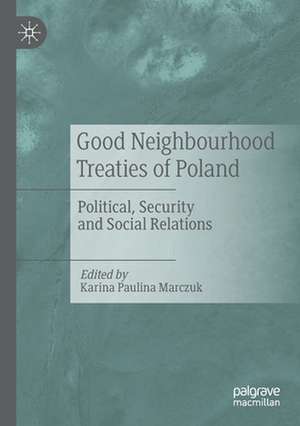Good Neighbourhood Treaties of Poland: Political, Security and Social Relations
Editat de Karina Paulina Marczuken Limba Engleză Paperback – 2 oct 2020
This volume explores the bilateral treaties concluded after 1990 between the Republic of Poland and its neighbouring states (Germany, then-Czechoslovakia, Ukraine, the Russian Federation, Belarus and Lithuania), known as treaties on neighbourly relations or good neighbourhood treaties. These treaties, through which Poland and its neighbours were able to establish their political, security and social relations, were extremely significant in that they provided a unique way for them to organise their interstate post-Cold War relations. This book analyses the consequences of these treaties and addresses a variety of issues, including security policy and cooperation, migration, national minority rights, economic cooperation, education, and cross-border cooperation.
| Toate formatele și edițiile | Preț | Express |
|---|---|---|
| Paperback (1) | 581.01 lei 6-8 săpt. | |
| Springer International Publishing – 2 oct 2020 | 581.01 lei 6-8 săpt. | |
| Hardback (1) | 728.91 lei 6-8 săpt. | |
| Springer International Publishing – 2 apr 2019 | 728.91 lei 6-8 săpt. |
Preț: 581.01 lei
Preț vechi: 683.54 lei
-15% Nou
Puncte Express: 872
Preț estimativ în valută:
111.17€ • 116.39$ • 91.99£
111.17€ • 116.39$ • 91.99£
Carte tipărită la comandă
Livrare economică 05-19 aprilie
Preluare comenzi: 021 569.72.76
Specificații
ISBN-13: 9783030126179
ISBN-10: 303012617X
Pagini: 262
Ilustrații: XIII, 262 p.
Dimensiuni: 148 x 210 x 20 mm
Greutate: 0.34 kg
Ediția:1st ed. 2019
Editura: Springer International Publishing
Colecția Palgrave Macmillan
Locul publicării:Cham, Switzerland
ISBN-10: 303012617X
Pagini: 262
Ilustrații: XIII, 262 p.
Dimensiuni: 148 x 210 x 20 mm
Greutate: 0.34 kg
Ediția:1st ed. 2019
Editura: Springer International Publishing
Colecția Palgrave Macmillan
Locul publicării:Cham, Switzerland
Cuprins
1. Chapter 1 Introduction.- 2. Chapter 2 Foundations of the good neighbourhood policy of the Republic of Poland.- 3. Chapter 3 Good neighbourhood treaties and public diplomacy: Polish activities in neighbouring states (2007–2014).- 4. Chapter 4 The 1991 Polish-German treaty: origin, aims and implementation. Successes, failures and prospects in the context of the migration crisis in Europe.- 5. Chapter 5 Objectives and outcomes of the 1991 German-Polish Treaty on Good Neighbourhood and Friendly Cooperation in light of the intra-European dispute on the 2015–2018 migration crisis.- 6. Chapter 6 The role of the education sector in relations between Poland and Germany, 1991–2016.- 7. Chapter 7 Security as an element of good neighbourhood policy in Central Europe. Case study: Polish-Slovak relations after 1990.- 8. Chapter 8 Slovak-Polish relations after 1989 – Slovak perceptions.- 9. Chapter 9 Security as an element of good neighbourhood policy in Central Europe: the case of Polish-Czech relations after 1990.- 10. Chapter 10 On human trafficking, Schengen visas and drunken workers: Czech media representations of Poland in light of three migration issues after 2013.- 11. Chapter 11 Relations of Polish authorities with the Polish diaspora in the (post)-Soviet space.- 12. Chapter 12 The Polish-Lithuanian treaty on neighbourly relations of 1994 and the Polish-Russian treaty on neighbourly relations of 1992 in the context of international protection of the rights of national minorities.- 13. Chapter 13 Treaty on Friendship and Neighbourhood Cooperation between Poland and Russia: implementation and challenges (a Russian perspective).- 14. Chapter 14 1994 Treaty between the Republic of Poland and the Republic of Lithuania on Friendly Relations and Neighbourly Cooperation: successes and new challenges.- 15. Chapter 15 Poland and Belarus 26 years after the signing of the Treaty on Good Neighbourhood and Friendly Cooperation.- 16. Chapter 16 Treaty between Ukraine and the Republic of Poland on Good Neighbourhood, Friendly Relations and Cooperation. Implementation and today’s challenges.- 17. Chapter 17 Conclusions
Notă biografică
Karina Paulina Marczuk is Assistant Professor at the Institute of International Relations, Faculty of Political Science and International Studies, University of Warsaw, Poland. She is a co-editor of the book series Poland’s Foreign Policy Library and editor of recent volume, Reconciliation–Partnership–Security: Cooperation between Poland and Germany 1991–2016.
Textul de pe ultima copertă
This volume explores the bilateral treaties concluded after 1990 between the Republic of Poland and its neighbouring states (Germany, then-Czechoslovakia, Ukraine, the Russian Federation, Belarus and Lithuania), known as treaties on neighbourly relations or good neighbourhood treaties. These treaties, through which Poland and its neighbours were able to establish their political, security and social relations, were extremely significant in that they provided a unique way for them to organise their interstate post-Cold War relations. This book analyses the consequences of these treaties and addresses a variety of issues, including security policy and cooperation, migration, national minority rights, economic cooperation, education, and cross-border cooperation.Karina Paulina Marczuk is Assistant Professor at the Institute of International Relations, Faculty of Political Science and International Studies, University of Warsaw, Poland. She is a co-editor of the book seriesPoland’s Foreign Policy Library and editor of recent volume, Reconciliation–Partnership–Security: Cooperation between Poland and Germany 1991–2016.
Caracteristici
Focuses on the challenges arising from the treaties and prospects for further bilateral cooperation Examines the historical dimension prior to 1990, enabling readers to better understand the complexity of Poland’s relations with its neighbouring countries Analyses how these treaties have affected relations in Central and Eastern Europe in the last 25 years
